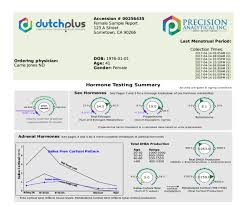My stance on testing is this: I recommend it when it is going to change the course of our treatment plan when we are at a crossroads, or need more information to make a decision about your health, and when we need to track progress of your treatments.
What this means is that sometimes we need to check things like blood sugar or iron levels to know if your diet or supplement recommendations are doing their job. Other times, we are looking to find the cause of your symptoms and need to determine what is happening within your body. These tests are generally also done with your family doctor. They are often a measure of one moment in time.
The coolest part though, is the wide variety of functional medicine tests that are available to Naturopathic Doctors. Functional tests give us huge insight into how your body is working, and often how to make your body work better. Due to the complexity of the specialized reports they can carry a higher price point, which is why we reserve them for when they are going to determine your next steps.
I have outlined 6 of these tests here (Food Sensitivity Testing, Thyroid Panel, Organic Acids Test, Hair Mineral Analysis, Female Month Long Hormone Panel, and Comprehensive Stool Analysis), but would like to introduce a few more to you now.
Functional Lab Tests
1. DUTCH Hormone Panel
I love love love this test. Hormones are complex messengers that can be measured in blood, however, knowing the amount of a hormone at any given time does not tell us the whole story. This urine test is very helpful at telling us how our hormones are being used and broken down. It lets us know about estrogen, progesterone, DHEA, testosterone, cortisol, as well as melatonin and neurotransmitters like serotonin and dopamine. It's also great for determining whether issues are stemming more from stress, or from reproductive health.
Who is it best for: Perimenopausal women or women with history of hormone dependent cancers or hormone diseases like endometriosis. (There is also a male version)
2. Adrenal Stress Panel
When we know stress is an issue, this test (available in both saliva or urine versions which are slightly different) helps us to determine whether you are in more of a depleted state or in overdrive. Even though you may feel one way or the other, it's not always possible to tell without measuring what's going on on the inside. By taking four samples over the day, we know whether or not you are making enough or too much cortisol, and how we can best support your stress response. It's critical to have this information since adrenal health, the stress glands, are also involved in our immune system, reproductive hormones, blood sugar regulation, and can impact the liver.
Who is it best for: People who are feeling overwhelmed, or stuck in overdrive. Also, for people who think they feel fine but do shift work, have insomnia, or have gone through stressful times or experience chronic stress or busyness. Basically everyone - haha.
3. Enhanced Healthy Living Assessment
Each family doctor has a different approach to bloodwork, however, I have found that more and more often patients are having fewer tests run in their regular screening exams. This helps to take pressure off of OHIP, but it doesn't always help give you peace of mind or catch issues at the best moment to work on prevention of disease progression. A blood test like this evaluates your blood, looks for inflammation and cardiovascular risk, assesses liver and kidney damage, as well as checks for nutrient deficiencies like iron and vitamin B12.
Who is it best for: Those who are looking for general screening or baseline measurements for later comparison, and people who want to catch issues before they become advanced and evaluate trends in their health.
4. Fatigue Panel
If I have to give the #1 most common symptom that I see in my practice, I would have to say that it is fatigue. Quite often, there is a stress or busy component to exhaustion, but it's also extremely important to rule out infection, nutritional deficiencies like B12 & iron (also Vitamin D), as well as thyroid dysfunction. This test can help to determine basic physiological causes for tiredness.
Who is it best for: Women with a history of low iron and/or B12, vegetarians, people who feel tired every day.
5. Insulin
There are a few ways to assess blood sugar regulation, like fasting blood glucose and the 3 month average called HbA1c. I really like checking insulin levels because this tells us about insulin resistance. Insulin resistance is the precursor stage to type 2 diabetes, where the cells are no longer responding as well to insulin, but you haven't yet developed diabetes. Finding high insulin levels before high blood sugar levels show up is the best time to intervene with dietary and herbal treatments in order to prevent chronic disease (we can still manage it later, it's just more work).
Who is it best for: Persons with family history of diabetes, sugar dependence or cravings, if you get mid afternoon energy slumps, people who get 'hangry' (low blood sugar), if you have a metabolically based diagnosis like PCOS.
When the time comes to do further investigation because we are at a crossroads, I will let you know. However, if you are looking to take your health to the next level, please let me know so we can chat about your options.
Dr. Christa

 RSS Feed
RSS Feed